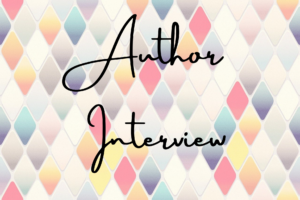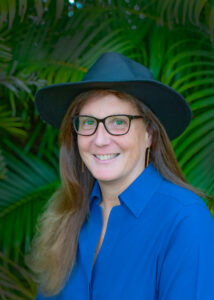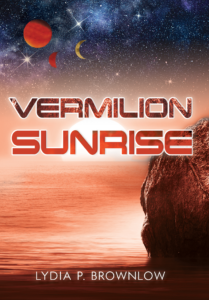Ending Up Where I Need to Be: An Interview with Lydia P. Brownlow
 The tagline for Lydia P. Brownlow’s debut novel, Vermilion Sunrise, is “Same galaxy. Different view.” The science fiction genre is one that I rarely read, but that tagline ensured the book’s spot on my TBR list. The book released in May of last year and has garnered great reviews. One reader said, “I finished this book both satisfied and really wanting more,” and another wrote, “The pacing of the prose is consistently good, which makes the initial world-building go by quickly. By the time the plot started to really move, I was in.” Anyone who enjoys young adult science fiction would be wise to pick up this book.
The tagline for Lydia P. Brownlow’s debut novel, Vermilion Sunrise, is “Same galaxy. Different view.” The science fiction genre is one that I rarely read, but that tagline ensured the book’s spot on my TBR list. The book released in May of last year and has garnered great reviews. One reader said, “I finished this book both satisfied and really wanting more,” and another wrote, “The pacing of the prose is consistently good, which makes the initial world-building go by quickly. By the time the plot started to really move, I was in.” Anyone who enjoys young adult science fiction would be wise to pick up this book.
Welcome, Lydia!
Christina: Congratulations on the publication of Vermilion Sunrise, which was released last year. It features Leigh, a teenager who “awakens from cryosleep to discover she’s part of the first human colony in another solar system.” Where did the idea for this novel come from?
Lydia: Thanks, Christina! I appreciate the opportunity for this interview.
Vermilion Sunrise originated out of a love of working with teenagers. I’ve been a middle school and high school English teacher, and I’ve coached swim teams and academic teams. In my experience, groups of teenagers often find creative solutions if you give them a task and then step out of the way. Before I started writing the book, I’d been thinking about this in terms of leadership. What might teens come up with if left to their own devices, if starting from scratch? Suppose a varied group of adolescents, male and female, from countries around the world, were thrown together without much guidance. Would it still be Lord of the Flies, or would it turn out better?
I set the story on a planet in another solar system because of a lifelong interest in space exploration. My childhood was filled with the real astronauts of the Apollo missions and the imaginary beings of Star Wars and Star Trek. Writing science fiction seemed a natural extension of my interests, and it gave me a way to leave a bunch of teenage characters on their own and see what they’d do.
Christina: The book is told from two points of view. Why two? Did you ever think about including more voices? Did you uncover any obstacles by using two points of view? How did you make sure the two voices were distinct?
Lydia: Though Vermilion Sunrise is very much Leigh’s story, there is a bigger story as well—that of the colony as a whole. I decided I needed more than Leigh’s point of view to better tell that story, especially since she’s a member of the third landing party. Each landing party has twenty teenage colonists. They arrive months apart from one another, giving them different experiences and perspectives. Originally, I tried using three POV characters, one from each landing party, but that was one voice too many. So, I switched to two and gave Lex, a member of the original landing party, as much development as Leigh.
The novel begins with the arrival of Leigh’s landing party. By then, Lex has become one of the colony’s leaders, he’s been on the planet for six months, and he’s relatively happy with the way things are. Leigh is not at all happy about any of it, and she disrupts the status quo, which makes for an interesting juxtaposition of her perspective and Lex’s.
And you’re right, it was important to me to ensure the voices were distinct. I did some revisions focused on solely Lex’s chapters and then solely Leigh’s, so that I could be sure the voice of each rang true.
Christina: What sort of research did you need to perform to write the book? Did you find out anything surprising?
Lydia: My casual interest in space travel and exoplanets—planets outside our solar system—turned into real research once I started drafting Vermilion Sunrise. I wanted to write what some people call “hard” science fiction … the kind of sci-fi that, given the science we know today, everything in the story is possible. This approach necessitated a lot of research, but it also set some interesting parameters.
For example, the Epsilon Eridani system, where the book takes place, is about ten light-years from Earth. If you eliminate the possibility of faster than light travel, you’re talking about a very long journey. That meant I needed to learn not only about potential cryosleep (artificial human hibernation), but also about propulsion that wouldn’t require refueling. Solar sail technology is in its infancy; however, it has been achieved, and I was inspired to use solar sails as the means of traveling through deep space. But solar sails are huge, so there would have to be another means of landing on the planet.
That’s why the characters arrive one shuttle-load at a time with different landing parties arriving months apart from one another—a dynamic that’s an integral part of the story. Would I have considered different landing parties if it weren’t for my research on solar sails? Maybe. But maybe not! So, that’s one example of how my scientific research helped shape my storytelling.
As far as surprising research, I think the biggest one was astrobiology. Before writing the novel, I didn’t even know the field of astrobiology existed. Now, I’m fascinated by it. Astrobiology is the study of life in the universe. How did life originate? Where else might we find life? How do we look for it? Many details in Vermilion Sunrise are inspired by the research of astrobiologists—from the colors of the plants to the creatures my characters call ‘glitterblobs.’ I’m grateful to all the astrobiologists who share their work publicly so that I have access to it.

Christina: The discussion questions for the book are amazing. In one, you talk about the three things that each colonist brings from Earth. If you could only bring three things from Earth, what would they be and why?
Lydia: If I could bring any three things, it’d be my husband and two sons! But my characters are restricted to three inanimate items that all fit in a small bag, so I’ll stick to those restrictions. Some of my characters are more practical than others and bring useful items. Unfortunately, I’d probably not be in that category and would bring impractical things, like my wedding ring and my favorite family photo. For the third item, hopefully, I’d get practical. Assuming I was going to the same planet as my characters—a planet 89% covered by water—I’d bring a pair of swim goggles or a snorkeling mask, something to help me see in all that water.
Christina: In addition to discussion questions, your website also contains resources for educators. Can you tell me a little about those?
Lydia: A lot of readers have been interested in the science behind my science fiction, so I added a section on my website that provides information and links to videos, diagrams, and articles concerning seven topics: exoplanets; astrobiology; solar sail propulsion; time dilation; orbits; the star Epsilon Eridani; and the Epsilon Eridani system.
In addition, I’m a staunch advocate for cross-curricular learning and believe that YA science fiction is a perfect medium for science/literature connections. That’s why my website includes a one-page document summarizing the benefits of such cross-curricular work. There’s also a link to a sample interactive assignment using Vermilion Sunrise as part of a joint English/Intro to Physics project. I’ve shared it so that educators can use or modify it, or be inspired to create something similar of their own.
Christina: I love the array of quotes on your website, including one from Douglas Adams and The Long Dark Tea-Time of the Soul: “I may not have gone where I intended to go, but I think I have ended up where I needed to be.” Why does this one resonate with you?
Lydia: I feel like that quote is the story of my life! I believe in goal-setting, but I also believe in being flexible and open-minded to what life brings you. And I’ve certainly had those “Ah-ha” moments when even the most winding of paths has put me either where I needed to be for myself, or where I needed to be for others. There’s a certain magic to that.
Vermilion Sunrise exists because of that kind of magic. When I was in law school, I didn’t intend to become a YA sci-fi author, but I did work hard to become a Teaching Assistant, an experience that led me to seek out some teaching positions amidst years of working as an attorney. Eventually, I found myself applying for a position as a secondary school English teacher. For over a decade, I taught 8th, 10th, and 12th grade and had the privilege of sharing many books with those students. There’s a famous quote from author Toni Morrison: “If there is a book that you want to read, but it hasn’t been written yet, then you must write it.” For me, there was a book I wanted to hand to many of my students, but it hadn’t been written yet, so I wrote it. And now I’m writing another … in other words, or rather in the words of Douglas Adams, ending up where I need to be.
Christina: You’ve held an assortment of jobs—“from lawyer to swim coach to teacher,” and you’ve “taught high school, junior high, college, and law school.” Do those experiences inform your writing at all?
Lydia: Absolutely. I mentioned earlier how the essential premise of the novel came from working with teenagers. Many of the themes do too, including those of compromise and working together despite disagreement, concepts that are at the heart of my legal background as well. One of the essential traits of a good lawyer is being able to see the other side’s point of view—maybe so you can argue against it, or maybe so you can reach a mutually beneficial agreement. And let’s face it, life is messy. That’s on full display in every job I’ve ever had! And part of why I enjoyed writing the story from two different points of view.
Christina: Would you share a little bit about your publishing journey?
Lydia: There are so many avenues to publication, and I had a lot to learn about the publishing industry. I attended both in-person and online seminars to try to figure it out, and I would encourage any writers hoping to get published to do the same. But my #1 piece of advice is this: don’t give up! My second piece of advice is to seek feedback from others. I found both to be essential to my own publishing journey. I received a lot of feedback between revisions that helped get my manuscript ready for submission. Even so, I still had more than my fair share of rejections; I think most authors have! In fact, I’ve heard people say that persistence is the most important trait a writer can possess, and that might be true. Though I believe you also need a dash of luck, as well.
I lucked out when one of my beta readers attended an event hosted by Warren Publishing at Corks, Cooks, & Books in Rock Hill, SC. The beta reader contacted me that week to tell me how impressed she was by the event. She thought Vermilion Sunrise might find a home with that publisher and encouraged me to submit my manuscript. Turns out, she was right!
Christina: Last fall, you had the pleasure of attending two book festivals. How did they go? Any lessons learned?
Lydia: I was honored to be accepted as a debut author to the Kentucky Book Festival in Lexington and the Louisville Book Festival. I’m a Kentucky native, so it was nice to go ‘home’ for both events. I loved seeing how readers of all ages attended the festivals and how much enthusiasm they had for meeting not just well-established authors, but also new ones like me.
At one of the festivals, there were a dozen YA authors, and we were grouped together, which was fun. There was camaraderie among the group, everyone willing to send a reader to a neighboring table if their interests matched someone else’s writing instead. That was another thing I noticed at both festivals: authors weren’t trying to “hard sell,” they were looking for potential readers who’d be a good fit for their books.
I also got a taste for what a massive endeavor it is to put on a book festival. It takes a ton of energy, dedication, and funds. And the two festivals I attended bolster literacy initiatives in the community—supporting kids, libraries, and independent bookstores. So much to love!
Christina: What’s next for you?
Lydia: I’ve been invited to another book festival later this month: the Amelia Island Book Festival in Florida on February 24. And I have a few days scheduled for research concerning a potential future project. But those are the unusual days. Most days, I’m working on the sequel to Vermilion Sunrise. Leigh’s story has a solid arc, a beginning, middle, and end as she figures out what it means to call somewhere home. But the story of the colony she’s a part of, there’s a lot more of that story to tell. I can’t wait to share it with readers!
Lydia can be found in multiple places!
Website: www.lydiapbrownlow.com
Instagram: @lydiapbrownlow
Twitter/X: @brownlow_lydiap
Thanks to Lydia for agreeing to this interview! If you know of an author or artist who’d like to be featured in an interview (or you would like to be featured), feel free to leave a comment or email me via my contact page.

